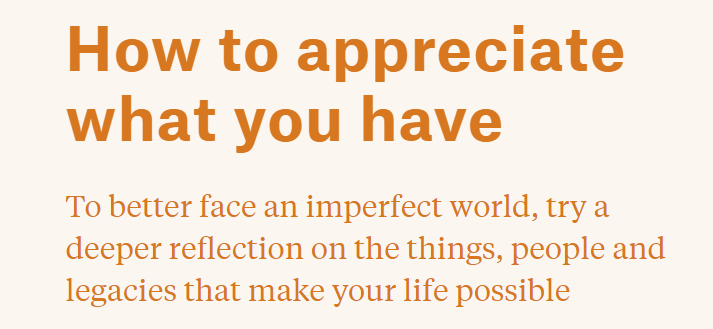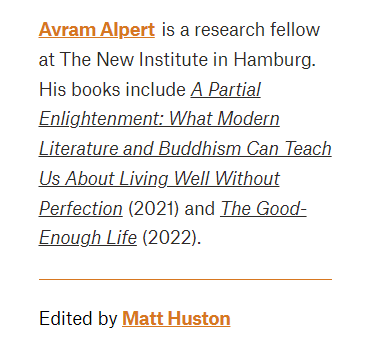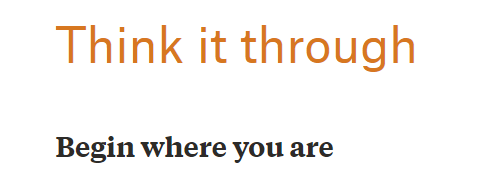Welcome to DU!
The truly grassroots left-of-center political community where regular people, not algorithms, drive the discussions and set the standards.
Join the community:
Create a free account
Support DU (and get rid of ads!):
Become a Star Member
Latest Breaking News
General Discussion
The DU Lounge
All Forums
Issue Forums
Culture Forums
Alliance Forums
Region Forums
Support Forums
Help & Search
The DU Lounge
Related: Culture Forums, Support ForumsHow to appreciate what you have


https://psyche.co/guides/how-to-appreciate-what-you-have-even-when-it-is-not-perfect



To appreciate what you have is to recognise the value of the people, things and world around you, as well as your own attributes – and to treat all of these with the care and consideration they deserve. In this sense, appreciation means not just being grateful for what you have or what you’ve been given, because gratitude does not necessarily imply an attitude of care and consideration. Appreciation, as I use it here, may begin with thankfulness for what you have, but it goes beyond that to a broader understanding of how the world works and what is valuable in that. Appreciation can also lead us to a critical attitude in a way that gratitude does not, because we may recognise that the world and its inhabitants are not cared for as they should be. It is not easy to engage in this kind of appreciation, and not only because it asks us to think in these multiple registers. Even when things are going well, you might not feel that you appreciate it all as much as you could or should. Alternatively, maybe you’re not sure that you have anything genuinely worth appreciating. There are many general reasons why appreciation can be challenging, and they stretch across psychology, culture, economics and politics.
Humans are incredibly complex creatures with competing instincts. We have neurons telling us to get what’s ours and to achieve social status, while simultaneously leading us to underestimate our gains. One explanation for this is that we evolved to go through a boom-and-bust pleasure loop. Humans don’t just have to eat or procreate once, in order to pass on their genes; we have to do it continually. So we are led to desire something, get it, and then not be satisfied by it. The famous image for this in modern psychology is the hedonic treadmill: we’re always running toward what we think will make us happier, and always ending up back where we started. Contemporary culture often adds pressure to this dynamic. Reports suggest that many of us, and especially young people – from the United States to China, and everywhere in between – are feeling burnt out and overwhelmed by never-have-enough cultural messaging. People are told to work hard to get ahead, but many are finding themselves stifled by limited opportunity, and even those who do get ahead don’t necessarily feel any happier or more fulfilled. There are also the very real economic pressures created by winner-take-all economies and cost-of-living crises.
Even people who may have once felt that they had enough have been squeezed by inflation and variable interest rates. On top of all of that is the looming danger of climate change and the creeping sense that you might not be able to survive without having power over vast resources. If you’re like me, you might also have some political resistance to the idea of appreciation. The idea that we should ‘appreciate what we have’ can strike one as a ruling-class ideology: ‘You peasants should be grateful we feed you slop at all.’ We shouldn’t appreciate – we should have a revolution! I understand this resistance. But over time, I have come to believe that not appreciating what I have is an even crueller way of looking at the world. It’s like a little voice in your head saying: ‘Not only do you not have enough, but you should also be miserable about it.’ I remain a diehard egalitarian who is horrified by the levels of inequality in this world. But I no longer think that refusing to appreciate what I have is going to make the world a better place, or make us as individuals any more likely to change things.
In fact, once I opened up to the idea, I realised that, for myself at least, the more appreciative I am, the more I care about the world and institutions around me, and the more I want to help them improve. And for many people, because appreciation may improve your wellbeing and increase your concern for the world around you, it could even make you more likely to engage in political activity. I write could rather than will because of the fact of our different psychological make-ups. Many people want to change things precisely because of unhappiness with the current situation, after all. So not everyone will benefit from increasing their appreciation, but everyone might as well try it out before deciding that. This Guide is an invitation to take up that attempt. It is written from my perspective as someone who has studied various philosophical, religious and literary traditions that have something to say about appreciation. In many times and places, you can find a focus on heroism, greatness and the elite, with the accompanying belief that we should appreciate what the best among us have to offer. In other settings, there is more of a focus on the value of all of our lives, and a sense that what makes this world work is the mutual appreciation of equals. When I write about appreciating what you have, I mean it in this latter, universal sense.

To better appreciate what you have, a key task is.................................
snip
InfoView thread info, including edit history
TrashPut this thread in your Trash Can (My DU » Trash Can)
BookmarkAdd this thread to your Bookmarks (My DU » Bookmarks)
1 replies, 298 views
ShareGet links to this post and/or share on social media
AlertAlert this post for a rule violation
PowersThere are no powers you can use on this post
EditCannot edit other people's posts
ReplyReply to this post
EditCannot edit other people's posts
Rec (4)
ReplyReply to this post
1 replies
 = new reply since forum marked as read
Highlight:
NoneDon't highlight anything
5 newestHighlight 5 most recent replies
= new reply since forum marked as read
Highlight:
NoneDon't highlight anything
5 newestHighlight 5 most recent replies
How to appreciate what you have (Original Post)
Celerity
Apr 19
OP
XanaDUer2
(10,792 posts)1. Kick